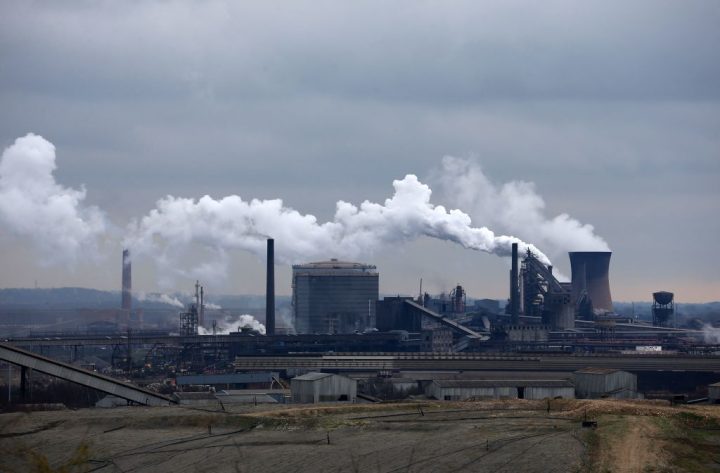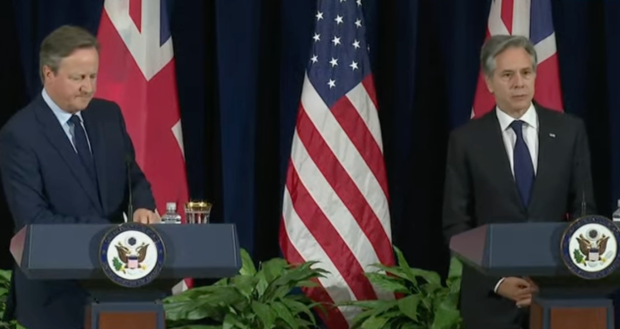Scunthorpe is an industrial garden town, or so the signs welcoming you to the town say. It’s written beneath the town’s crest, with a blast furnace on top and the town motto: Refulget labores nostros coelum. The heavens reflect our labours.
If, like me, you grew up in Scunthorpe you can easily ignore the steelworks. Visitors might be surprised by the noise or alarmed if the clouds on the east of the town sometimes seem a dusky red but we’re used to it. The steelworks have been there longer than any of us after all. But on your first visit, they are hard to ignore.
What sticks in the craw is that these jobs aren’t outdated or not needed
Cooling towers are an imposing sight, the sheer size of the works hard to get your head around. When I was younger I remember people always saying not to drive that way in the early afternoon because you’d undoubtedly get stuck in traffic at shift change. That doesn’t happen any more.
Sure, people my age might have had a grandparent who spent their working life on the works but not a parent, not anyone working now. The number of jobs supported by steel – directly or indirectly – is much smaller than it was two generations ago, but that doesn’t mean we need to hasten their demise entirely.
That belief is not because of some outdated nostalgia for a romanticised industrial past. I’ve been critical of calls to nationalise the steel industry in the past, based almost entirely on a yearning for an image of Britain that we have, by and large, left behind.
Like the shipyards in Sunderland or coal mines dotted across the country, I’ve never been entirely sure the stranglehold steel has over Scunthorpe is helpful. It’s part of the fabric, of course, a proud piece of history, but times change. Private sector investment, not a taxpayer-funded crutch, is what towns like Scunthorpe need to support the sectors which can help them flourish, not cling on to the past.
What the government is doing now though isn’t providing a crutch, it’s taking a bat straight to our knees. In response to the drive to net zero – and the enormous taxpayer funding subsidies that come with it – British Steel’s Chinese owners are planning to close the blast furnaces, shifting domestic steel production to electric arc furnaces, at the cost of 2,000 jobs.
Blast furnaces use coke and generate huge amounts of carbon dioxide; electric arc furnaces, unsurprisingly, use electricity, including renewable sources, hence the push to switch. But whereas blast furnaces make virgin steel, electric arc furnaces are used to melt down and repurpose scrap steel.
That seems even more green, some would say, but repurposed, recycled steel isn’t the same quality. It cannot be used in construction or for motor manufacture – two industries Britain does still have at some scale. The need for virgin steel isn’t going away, we will simply be forced to import it, mostly from China who certainly are not rolling back virgin production for the sake of net zero. Does the government, with its rightful focus on insulating our energy security from Russia, really believe we should be handing over money to China to buy the steel we need to build railways and power stations, or put to any military use?
Politicians used to talk about a green industrial revolution, one which would bring new jobs, hi-tech jobs, but those were never the sort of jobs a steel plant worker would be able to retrain into. As my colleague Karl Williams has pointed out, the ONS is working to map the size of the UK’s low carbon and renewable energy economy. The most recent estimates show the total number of full-time equivalent jobs in the green economy has increased by just 11,500 since 2014. That’s growth of 4.9 per cent during a period when the number of people in employment increased by 5.3 per cent.
What subsidies and policies like this do is throw into sharp relief the fundamental disconnect – you could even say incompatibility – between two key planks of recent Conservative thinking: that you can level up the country, drive economic growth in towns across the North and Midlands, and meet net zero targets by 2050.
Whether it’s in Scunthorpe, Port Talbot, or Teesside, the steel industry doesn’t need saving because it ruins a town motto or because the local football team nickname wouldn’t make sense any more. It doesn’t even need saving because there are jobs on the line – workforce needs change and propping up old skills, holding back the labour market from adapting to new realities, only inhibits our competitiveness.
What sticks in the craw is that these jobs aren’t outdated or not needed. They are vital to maintaining a small but crucial industry and they are being sacrificed in a push to get to net zero which fails to consider the long-term ramifications. Virgin steel production needs saving because there are hard-headed, strategic reasons for protecting our domestic production capacity. Once blast furnaces close, they very rarely come back.
Got something to add? Join the discussion and comment below.
Get 10 issues for just $10
Subscribe to The Spectator Australia today for the next 10 magazine issues, plus full online access, for just $10.




















Comments
Don't miss out
Join the conversation with other Spectator Australia readers. Subscribe to leave a comment.
SUBSCRIBEAlready a subscriber? Log in